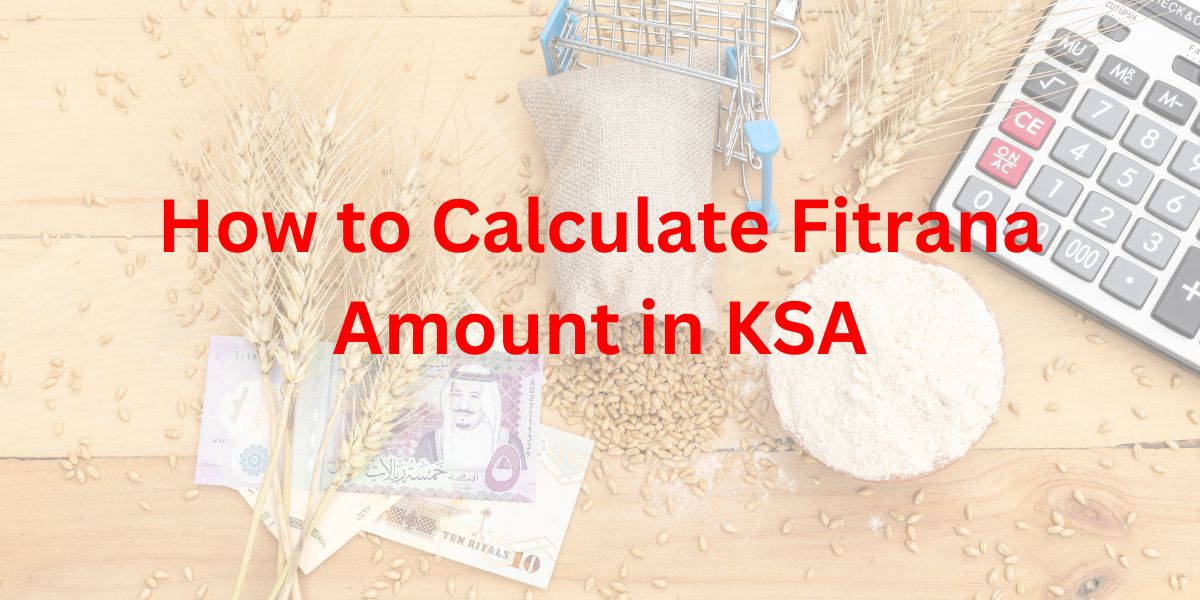As the holy month of Ramadan graces us with its presence, Muslims around the world prepare to fulfill one of their important religious duties paying Fitrana. In the Kingdom of Saudi Arabia (KSA), calculating the Fitrana amount is a practice that every Muslim must perform before the Eid-ul-Fitr prayers. This article will guide you through the process of calculating Fitrana in KSA:
What is Fitrana?
Fitrana, also known as Zakat al-Fitr, is a form of charity given to the poor at the end of Ramadan. It is obligatory for every Muslim, regardless of age or financial status. The purpose of Fitrana is to purify those who fast from any indecent act or speech and to help the needy celebrate the festival of Eid.
How Much Should You Pay?
The amount of Fitrana is linked to the price of staple food items such as wheat, barley, dates, raisins, or cheese. In KSA, the Fitrana amount is commonly calculated based on the price of rice.
The Calculation Method
The Fitrana amount is equivalent to one ‘Sa’a’ of food. One Sa’a is an ancient measure which equals approximately 3 kilograms or 6.5 pounds of food. To simplify the calculation, you can follow these steps:
- Determine the Price of Food: Find out the current price of 3 kilograms of the staple food item you are using to calculate Fitrana. For example, if rice is priced at SAR 10 per kilogram, then 3 kilograms would cost SAR 30.
- Calculate Per Person: Multiply the price of 3 kilograms of food by the number of people in your family. For instance, if you have five family members, you would calculate 5 times SAR 30, which equals SAR 150.
- Consider Your Financial Status: The calculated amount is the minimum you should pay. If you are financially able, it is recommended to give more to help those in need.
What is the significance of Fitrana?
Fitrana, also known as Zakat al-Fitr, holds a deep spiritual significance in Islam. It is a mandatory act of charity that serves several key purposes:
- Fitrana, also known as Zakat al-Fitr, holds a deep spiritual significance in Islam. It is a mandatory act of charity that serves several key purposes.
- Purification: Fitrana acts as a purification for Muslims who have fasted during Ramadan. It cleanses them of any minor errors or indecent acts they may have committed during the holy month.
- Solidarity and Compassion: By giving Fitrana, Muslims show solidarity with the less fortunate members of the community. It is a practical demonstration of empathy and compassion, as it helps those in need to celebrate the festival of Eid-ul-Fitr.
- Inclusivity in Celebration: The payment of Fitrana ensures that every member of the Muslim community, regardless of their financial situation, can partake in the joyous festivities of Eid. It reinforces the sense of unity and happiness among Muslims worldwide.
- Social Justice: Fitrana embodies the principles of social justice in Islam. It is a means to redistribute wealth within the community, ensuring that the basic needs of the poor are met during the time of celebration.
In short, Fitrana is not just a financial transaction; it is an expression of the Islamic values of brotherhood, generosity, and care for the well-being of the entire community. It allows everyone to share in the happiness of Eid and promotes a balanced and harmonious society.
When to Pay Fitrana?
Fitrana should be given before the Eid-ul-Fitr prayers. Ideally, it should be paid after the moon for Shawwal (the month following Ramadan) is sighted and before you go for the Eid prayer. This ensures that the needy can use the Fitrana to celebrate Eid.
Who Should Pay Fitrana?
Every Muslim is required to pay Fitrana. The head of the household can pay on behalf of all family members, including children and any dependents.
Related Articles
In Cash or Food?
While it is traditionally given in the form of food, many scholars agree that it is acceptable to give Fitrana in cash, equivalent to the value of the food amount required.
Whom to Give Fitrana?
Fitrana should be distributed to Muslim families who do not have enough to feed themselves. It can be given directly to individuals or through local mosques and charities that collect and distribute Fitrana.
Conclusion
Calculating Fitrana is a simple yet significant act of worship. By following the steps outlined above, you can easily determine the Fitrana amount you need to pay. Remember, this small act of kindness can make a big difference in someone’s life during the festive season of Eid.
People May Ask
What is Fitrana?
Fitrana, known as Zakat al-Fitr, is a charity given by Muslims at the end of Ramadan. It is like a gift to ensure everyone can enjoy Eid.
How much Fitrana should I pay in KSA?
In KSA, it’s recommended to pay SAR 30 per person. This is based on the price of rice, which is a common food item used for Fitrana.
When should I pay Fitrana?
You should pay Fitrana before the Eid-ul-Fitr prayers. It is best to do it after the moon for Shawwal is sighted and before the Eid prayer.
Who needs to pay Fitrana?
Every Muslim needs to pay Fitrana. This includes men, women, children, and adults. The head of the household can pay for everyone.
Can I pay Fitrana in cash?
Yes, you can. While traditionally given in food, many scholars say it is okay to give the equivalent amount in cash.
Who should receive Fitrana?
Fitrana should go to Muslim families who need help to have enough food. You can give it directly to people or through your local mosque.
